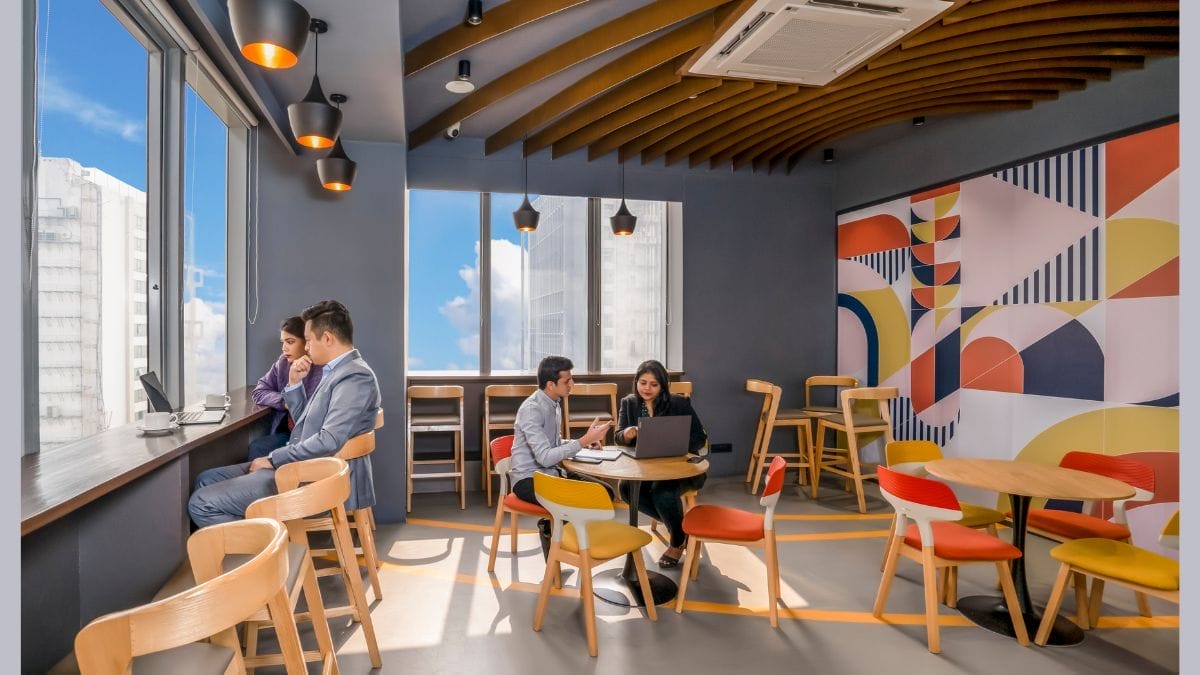Akasa Coworking, founded in 2020, is focused on providing premium office spaces with the finest in class services and hospitality. Its first centre started in October 2020, the second in November 2021, and after the journey so far, the company started the year 2023 with seven coworking centres. Currently, its coworking spaces are spread across four cities, and the company is also looking to expand its wings to other cities.
It offers end-to-end solutions to all sorts of businesses, from housekeeping to refreshments to internet facilities and many more. To attract young professionals, Akasa’s ambience and interior are designed to be very vibrant and closer to the environment. The platform provides collaboration zones, meeting areas, multiple break-out areas, open seats and big cafeterias so that individuals can work from these places or have a formal conversation. Additionally, to ease their work stress, it has infrastructure like a games room, gym facilities, etc., so people can go there between their meetings or during any leisure time. Aditya Mehta, CEO & Co-Founder of Akasa Coworking, give Hello Entrepreneurs insight into Akasa Coworking.
What was the idea behind Akasa Coworking?
Akasa Coworking embarked on making shared offices available for all with the prime focus on five elements of life – earth, water, fire, wind and space. Our priority has always been to ensure high-quality hospitality and services to enhance work productivity. We had already been in the real estate industry for quite a long time with several construction projects and were also into financing. So, for one such business meeting, I once went to a top-notch coworking centre in Gurgaon and over there, I personally liked the concept and felt that this was the kind of space where I, as a professional, would prefer to work from. Each additional facility at the coworking centres, like the ambience, networking opportunities, growth opportunities, etc., is extremely intriguing.
The overall system is a 3600 solution given to the client, and I wanted to provide the same service and solution to the other companies that cannot access it but are looking for it in different parts of the micro market or different parts of the city. So, the idea behind creating our coworking space was to provide an end-to-end solution and create a solution-driven ecosystem where businesses can be fostered with opportunities for enhanced productivity and growth. That is why, before starting, we had spent months on research and development. Our venture began in 2019, and till now, we have created technology-driven state-of-the-art working spaces to host several startups, entrepreneurs, MNCs and enterprises. How does Akasa stand out from its competitors; what unique features does it offer to its clients?
How does Akasa stand out from its competitors; what unique features does it offer to its clients?
We offer all customized built-to solutions with different types of products. Firstly, we have coworking spaces, where we provide the flexibility to change the cabin sizes with collapsible partitions to accommodate all kinds of clients; if it is a four-seater, we can convert it into a 10-seater. We also have offered managed working spaces, providing build-to-suit solutions, through which our clients get the same workplace they desire regarding furniture, branding, or anything else. Also, for leisure, we offer a games room, gym areas, Akasa power zone, which has cardio machines, etc. And we are also focusing on adding religion-specific prayer rooms at our coworking centres. We are 100 per cent solution-oriented and have spaces starting from 20 seats ranging up to any number of seats as per the client’s requirement. We are providing huge cafeterias where we serve food as well. Our focus is all customer-oriented and solution-driven. We also plan to put solar panels in the terraces to reduce the country’s overall carbon footprint.
Are Coworking Spaces replacing traditional offices; what’s your take on the same?
Indeed, coworking spaces have started replacing traditional offices, primarily because while providing space for working, coworking spaces also put on the capex to give an amazing experience, which is driving the popularity of shared office spaces. To simply state, instead of purchasing and building their own office, if a client is renting the coworking spaces, they will get the benefits of all the common infrastructure which is there, like the reception, the games room, the gym area, the prayer area, cafeteria, conference rooms, meeting rooms, and well-equipped infrastructure. All of this the clients can avail at a coworking space at around 20-25 per cent less cost than what they would have had to spend if they have done it by themselves, and the best part is that they don’t need to manage it as the management of the space is the responsibility of the coworking players. So, through coworking spaces, businesses can save money while getting better infrastructure, and that is how the industry is replacing traditional offices.
How’s your journey been; what are the challenges you faced?
Our journey has been good despite a few challenges, the major one being the unprecedented pandemic, as we started our journey in 2020 and there were major disruptions from early 2021 and getting clients in a new centre in the COVID era was very difficult. Although we had our safety standards and hygiene in place, convincing a client during that testing time was quite challenging. Another challenge was understanding the micro markets; we have a presence in four different micro markets, which are all very different in characteristics. We had to carefully understand the market needs and how we could place ourselves as a leading player. We had to deal with every market with different approaches and keep moving forward. Certainly, we have faced competition during our journey so far, but healthy competition is always good, and that is how the industry sustains itself.
What are your endeavours in the next five years for Akasa?
The next five years are our growth years, and while we have already established ourselves in four cities, we look forward to expanding more. At least in the next year, we plan to create our presence in two to three more cities and expect to grow at the same rate, i.e., 2 to 3 cities each year. In the next five years, we are projecting to have a presence in all major cities, and while having our presence, we plan to increase the density of our presence in each city. Our primary plan is to keep multiplying the number of centres, cities, the companies we are serving and the number of seats. We want to provide workplace solutions to the country’s leading players, create good campuses for bigger clients, and cater to all their needs.





